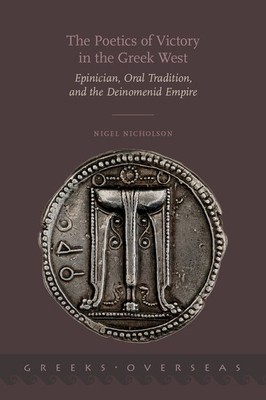
- We will send in 10–14 business days.
- Author: Nigel Nicholson
- Publisher: Oxford University Press, USA
- ISBN-10: 0190209097
- ISBN-13: 9780190209094
- Format: 15.5 x 23.6 x 2.5 cm, hardcover
- Language: English
- SAVE -10% with code: EXTRA
Reviews
Description
The Poetics of Victory in the Greek West examines the relationship between epinician and the heroizing narratives about athletes, or "hero-athlete narratives," that circulated orally in Sicily and Italy in the late archaic and early classical period. Drawing on the colorful stories told about athletes in later sources, the fragments of Simonides, and the surviving odes of Pindar and Bacchylides, it argues that epinician was formed in opposition to orally transmitted narratives and that these two forms-epinician and the hero-athlete narrative-promoted opposed political visions, with epinician promoting the Deinomenid empire and its structures and the hero-athlete narrative opposing Deinomenid rule. Combining an intimate knowledge of the material culture of the Greek West with an innovative use of available source material, The Poetics of Victory in the Greek West exposes the rich intersections between athletics and politics in Sicily and Italy, offering a new and compellingaccount of Deinomenid self-promotion and of the varied and complex communities that operated under the Deinomenids' control or within their shadow. Further, by establishing models of production and interpretation for the orally transmitted narratives and bringing them into dialogue with epinician, The Poetics of Victory in the Greek West reveals much about epinician as a form, how it developed in the Greek West, what meanings it already carried, and what meanings it accrued as it was appropriated by Hieron the second Deinomenid ruler.
EXTRA 10 % discount with code: EXTRA
The promotion ends in 19d.00:30:51
The discount code is valid when purchasing from 10 €. Discounts do not stack.
- Author: Nigel Nicholson
- Publisher: Oxford University Press, USA
- ISBN-10: 0190209097
- ISBN-13: 9780190209094
- Format: 15.5 x 23.6 x 2.5 cm, hardcover
- Language: English English
account of Deinomenid self-promotion and of the varied and complex communities that operated under the Deinomenids' control or within their shadow. Further, by establishing models of production and interpretation for the orally transmitted narratives and bringing them into dialogue with epinician, The Poetics of Victory in the Greek West reveals much about epinician as a form, how it developed in the Greek West, what meanings it already carried, and what meanings it accrued as it was appropriated by Hieron the second Deinomenid ruler.


Reviews